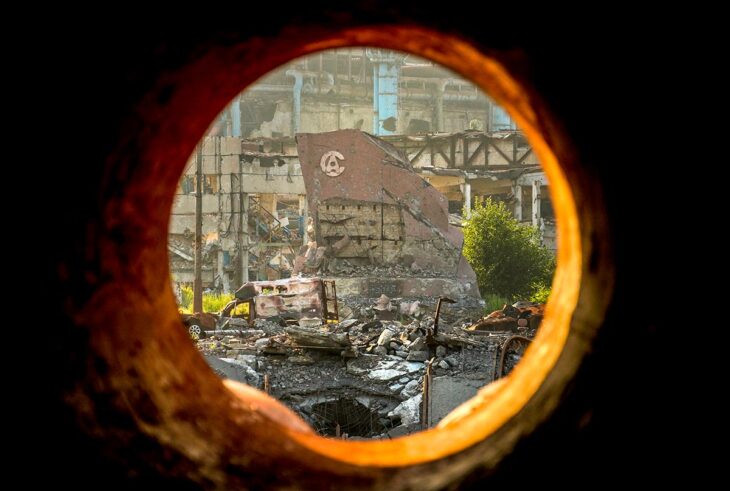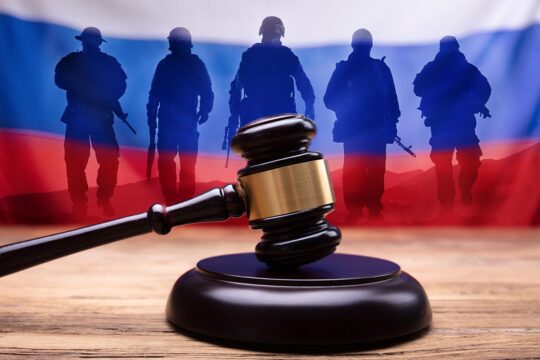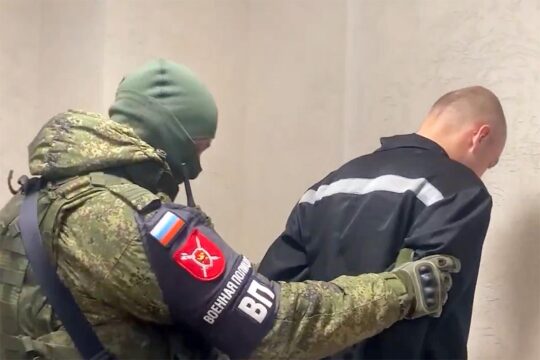In May 2022, Russia captured about 2,500 soldiers at “Azovstal”, an iron and steel factory in Mariupol. The main Ukrainian city on the Northern coast of the Sea of Azov had then been under siege for three months before Russian troops took complete control. It was in Mariupol that the Russian authorities announced the following month that they would run a mass trial of members of Ukraine’s Azov battalion, officially designated by Russia as a “terrorist” group. The project of this trial, however, never materialized. And a year later a criminal case against 24 of them opened in the Russian city of Rostov-on-Don. It is the most massive case received by the military court in Rostov-on-Don.
At the June 14 hearing, the prosecutor said that two of the defendants had already been exchanged. They are Azov lieutenant David Kasatkin and senior soldier Dmitry Labinsky. The prosecutor did not specify whether they would be tried in absentia. Their names are still listed in the materials on the website of the court. 22 others are being held in custody in a pre-trial detention center in Rostov-on-Don. At the last hearing which took place on June 28, 20 defendants were in the courtroom. Two defendants were not brought to the hearing due to illness.
There are 9 women among the defendants. In "Azov" they mostly worked as cooks or did chores. For example, 49-year-old Natalya Golfiner was the head of the Azov food warehouse in the village of Urzuf, Mariupol district. “I did my job to provide for my family. My husband needed an operation to remove a vertebral hernia, and my daughter was pregnant and also needed financial assistance,” she said during her interrogation, as quoted by one of the Russian media. Other cooks were Lilia Rudenko, Elena Avramova, Vladislava Mayboroda, Alena Bondarchuk, Lilia Pavrianidis, Irina Mogitich, Marina Tekin and Nina Bondarenko. One started working in the regiment after graduating from a technical school, another was advised by acquaintances. Some of the women prepared food for the soldiers in the dungeons of Azovstal while they held the line.
Only six active servicemen out of 22 defendants
Some of the defendants were no longer part of the Azov regiment by the time hostilities began. For example, Oleksandr Irkh was detained in April 2022 by the People's Militia of the self-proclaimed Donetsk People's Republic, in Eastern Ukraine, but he had served in Azov tank unit only in 2015-2020. Alexander Mukhin, Anatoly Gritsyk, Yaroslav Zhdamarov, Oleg Mizhgorodsky, Oleg Tyshkul and Artem Grebeshkov are also former members of the battalion. They had resigned from it between of 2018 and 2021.
Only six defendants were active servicemen of the National Guard of Ukraine. They are Oleg Zharkov, Artur Gretsky, Alexander Ishchenko, Alexander Merochenets, Alexei Smykov, and Nikita Timonin. They were captured in the spring of 2022, some in Mariupol and not always at the Azovstal metallurgical plant itself.
On June 14, the prosecutor established the identity of the accused. On June 28, he read out the indictment with references to the legal norms of the self-proclaimed Donetsk People's Republic. He therefore asked the court to adjourn the hearing and give time to bring the case into line with the Russian criminal code. The next hearing should take place on July 19. The defendants will have to declare their attitude to the case and admit guilt or not.
“Most of the defendants were not combatants at all and had nothing to do with armed actions,” says human rights activist Roman Kiselyov. “Theoretically, one can imagine that members of an armed formation can achieve some terrorist goals by their actions. But how cooks can implement them when preparing food is not very clear to me.” The lawyer recalls that Azov was a legal organization in Ukraine and was integrated into the country's armed forces. Therefore, individuals who went there for non-military jobs could not foresee such consequences because of their work. “As usual, the whole burden falls on the weakest and unprotected,” notes Kiselyov.
High-level prisoner exchanges
The Supreme Court of Russia recognized the Azov regiment as a terrorist formation in August 2022. The Prosecutor General's Office had demanded this in May against the background of the withdrawal of the regiment's fighters from Azovstal. For three months the plant had remained the only place in the city that was not under the control of the Russian military. In April, Russian President Vladimir Putin held back from storming Azovstal, ordering it to be blocked. With the mediation of the UN, negotiations on the evacuation of civilians and Ukrainian fighters intensified. At the beginning of May 2022, civilians were first taken out of the plant, then the wounded were evacuated, and later the military began to surrender. On May 20, 2022, Azovstal came under the full control of Russian forces. According to the Russian Ministry of Defense, 2,439 fighters of the Azov regiment surrendered. Ukrainian President Volodymyr Zelensky confirmed that more than 2,500 Azovstal defenders had surrendered.
On June 29, Moscow and Kyiv carried out an exchange of 144 prisoners on each side. Among the swapped fighters were members of Azov. At that time, it was the largest exchange since the beginning of the war. The State Duma (parliament) of Russia opposed the extradition of the Azov fighters. Its speaker Vyacheslav Volodin even had to make excuses for this decision. He assured that they exchanged only "heavily wounded [Ukrainian soldiers] and unable to participate in hostilities." The Azov battalion is of particular political importance because of its early and allegedly continuing association with far-right groups and neo-Nazi ideology.
“All members of the Azov Battalion are under investigation: who is involved in what, what they did,” Volodin said at a meeting of parliament last summer. However, a few months later, in September 2022, Russia extradited five more very senior Azov officers to Ukraine: Azov commander Denis Prokopenko (known by the call sign “Radish”), acting commander of the 36th Separate Marine Brigade Sergei Volynsky ("Volyn"), commander of the 1st separate battalion of marines Yevgeny Bovu, as well as Svyatoslav Palamar and Oleg Khomenko.
The exchange of commanders was part of a deal that saw the return of 200 more Ukrainians and ten foreigners. Russia received 55 prisoners of war in exchange, as well as businessman and pro-Russian politician Viktor Medvedchuk. In the media, he is called the “godfather” of Russian President Vladimir Putin.
Then other prisoners from Azovstal followed. At least 86 of them were handed over to Ukraine in November, and another 45 in May this year. The fate of hundreds of prisoners is still unknown.
Members of a terrorist group or participants in hostilities?
The defendants are also accused of attempting to overthrow the constitutional order and being trained to carry out terrorist activities. Some of the prisoners may receive life sentences.
“I wonder who the defendants could be trying to overthrow if they were operating on the internationally recognized territory of Ukraine at a time when even Russia itself did not recognize the “republics” [of Eastern and Southern Ukraine] as subjects of international law,” Kiselyov asks. All the defendants were detained in the spring of 2022, and the “referendum” on merging the occupied territories into Russia was held only in the fall.
Also, “the accusation of undergoing training actually duplicates the accusation of participation in a terrorist organization: participation in the organization implies a different range of activities, including training,” says Kiselyov.
Kiselyov notes that there are additional procedural problems in the case. Initially it was decided to try the prisoners according to the criminal code of the self-proclaimed Donetsk People's Republic. Because of this, part of the investigative actions took place without lawyers for the accused. The law of the “republic” did not provide for the mandatory presence of the defense in a criminal case. “Any evidence obtained in violation of the fundamental rule of access to a professional defense lawyer cannot be considered admissible in a Russian court. But this question was carefully omitted,” says the human rights lawyer. “In my opinion, so far the process is a mockery of justice,” he sums up.







